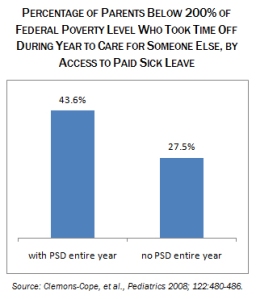From the report Evaluating Paid Sick Leave
Part 1 | 2 | 3 | 4 | 5 | 6 | 7 | 8 | 9 |10
A parent’s lack of paid sick leave can have a negative impact on the child’s health and school performance. For 74.4% of school-age children and 64.2% of preschoolers in Seattle, all parents in the family are in the work force.
Caring for a sick child or taking a child to see a health care provider during regular business hours is a significant problem without sick leave. Many childcare centers and schools have policies requiring sick children to stay home. The CDC recommends keeping children at home for 24 hours after a fever subsides.
The Seattle Public Schools and Seattle King County Public Health recommend keeping children suspected of having H1N1 home for at least 7 days and until all symptoms are gone for 24 hours.
Studies show children recover more quickly from illness with a parent present. Older children are sometimes kept home from school to care for younger siblings when parents are not able to take time off from work, affecting the older child’s educational outcomes.
 |
 |
Children in families with lower incomes are much less likely to have a parent with access to sick leave than higher income children. A study of employed parents based on 2003 and 2004 data found that just 36.3% of children in families with incomes below 200% of the federal poverty level had a parent with access to paid sick leave, compared to 80.9% of higher income children.
Children in low income families are also more likely to be in poor health. In Washington, 30% of children in families below the poverty level were rated by their parents as being in less than very good health, compared to about 9% of middle and upper income children.
Parents with low incomes are far more likely to take time off work to care for a child or other family member if they had paid sick leave. The 2010 San Francisco survey found that parents without access to sick leave were more likely to send a sick child to school: 75.9% of parents without access to paid sick days said their child had gone to school while sick, compared to 53.8% of parents with paid sick days.
More To Read
May 2, 2024
Baby Bonds: A Step Toward Racial and Economic Equity
The Washington Future Fund would bring this innovative, anti-racist policy to the Evergreen State
May 1, 2024
Laws Targeting LGBTQ Youth Aren’t Just Bad for Kids – They’re Bad For The Economy
The harm done by anti-LGBTQ laws expands so much further than queer children and teens
April 26, 2024
What is WA Cares and Why Does It Matter for Washingtonians?
We need to defend this important policy from billionaires looking to save a buck

